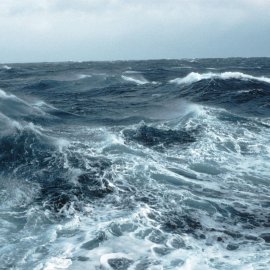Governing the High Seas
-
English
-
ListenPause
I’m Peter Neill, Director of the World Ocean Observatory. The earth’s surface is more than 70% ocean, supporting our claim that our planet would have best been called “Aqua,” more water than land, a sea of blue connecting the remaining disconnected green, where has been concentrated the history of human activity, for better or for worse. The nation states claim up to 200 miles from their coasts as areas of “national jurisdiction” over which they have the power to exploit, consume, and regulate. But the vast majority of the ocean lies outside those boundaries, an enormous reservoir of biodiversity that presents a very difficult challenge for governance and enforcement, for protection and sustainability. In 1967, international diplomats, representing some 160 countries, began discussions and negotiations for what became in 1973 the United Nations Convention on the Law of the Sea that, finally in 1994, was ratified by the requisite number of governments as a means “to define the rights and responsibilities of nations with respect to their use of the world's ocean, establishing guidelines for businesses, the environment, and the management of marine natural resources.” Many nations have joined the group; sadly, the United States remains a non-signatory, claiming to honor the spirit of the law while not committing to its specific terms and conditions. Since, international experts have been considering and debating how to create a binding instrument to address the changing accessibility of marine areas outside national jurisdiction and the new technologies, increased scientific knowledge, and expanding resource demands that impact them. An agreement was reached to create a process to navigate the many complex issues and the first meetings are now taking place. A recent overview by the Institute for Sustainable Development and International Relations, based in Paris, France, provides useful insight into how such an agreement becomes a reality. First, one has to recognize the true nature of the problem. There is no global framework for governance and the existing conditions are mostly characterized by confusion, conflicting interests, inadequate protections, commercial opportunities, and basic disagreement over core principles around which to organize change. Second, there are the collective, not always agreed perspectives of geo-political groups: The European Union; the G77; Africa, the Caribbean, and the Pacific; and the reluctant but active and influential outliers such as the United States, Canada, and Russia. A Preparatory Committee is meeting now into 2017 just to lay out the agenda and list of issues for negotiations that will include methods for reconciliation of disagreements, the creation of marine protected areas as a conservation structure, the management questions, consultation processes, and environmental assessments, and the integration of technology and skills to allow all nations equal capacity to participate successfully. There will be issues of institutional arrangements by which to decide, coordinate, and review; the potential undermining of existing relationships; the specific and volatile regulation of fisheries; and, of course, the penultimate matter of funding, what does it cost and who pays for it. If you think this is complex and time-consuming, it is. How long it will take? Will it innovate and truly address the sustainability intentions? If or when agreement is reached, will the nations ratify, contribute, or pay attention? Over the years of following the evolution of international ocean policy, I have become totally respectful of the many individuals who contribute to this process, indeed who dedicate their lives and careers to the detailed, tedious, incremental advances that are required to produce any kind of practical, applicable, effective international agreement. This is the invisible part of policy creation—the continuous meetings in faraway places; the word-by-word, line-by-line, issue-by-issue discussions and consensus agreements; the uncertainty of approval or indecision back home; the rigors and restrictions of international law; and the ever-changing political fronts as dynamic and directional as ocean weather and the sea itself. I could never do this essential work, and I am in awe and grateful for the knowledge, durability, and patience of those who do. We will discuss these issues, and more, in future editions of World Ocean Radio. WORLD OCEAN RADIO IS A PROJECT OF THE WORLD OCEAN OBSERVATORY IN ASSOCIATION WITH WERU FM, BLUE HILL, MAINE. WORLD OCEAN RADIO IS DISTRIBUTED BY THE PUBLIC RADIO EXCHANGE AND THE PACIFICA NETWORK. FIND OUR PODCAST ON iTUNES AND AT WORLD OCEAN OBSERVATORY DOT ORG.
Since the creation and ratification of the United Nations Convention of the Law of the Sea (UNCLOS), many international experts have been debating how to create a binding instrument to address marine areas outside of national jurisdiction—the high seas. In this episode of World Ocean Radio, host Peter Neill details the complex and time-consuming process of creating and implementing international ocean policy, and hails the work of the many people who contribute to the process of building an effective, practical, and applicable agreement for the benefit of all.
About World Ocean Radio
Peter Neill, Director of the World Ocean Observatory and host of World Ocean Radio, provides coverage of a broad spectrum of ocean issues from science and education to advocacy and exemplary projects. World Ocean Radio, a project of the World Ocean Observatory, is a weekly series of five-minute audio essays available for syndicated use at no cost by college and community radio stations worldwide. A selection of episodes is now available in Portuguese, Spanish, French, Swahili, and Mandarin, enabling us to reach 75% of the world's population. For more information, visit WorldOceanObservatory.org/world-ocean-radio-global.
Resource from this Episode
< UN Convention on the Law of the Sea (UNCLOS)
< IDDRI Publication: Toward a new agreement on high seas governance by Glen Wright, Julien Rochette, Elisabeth Druel, and Kristina Gjerd
- Login to post comments



